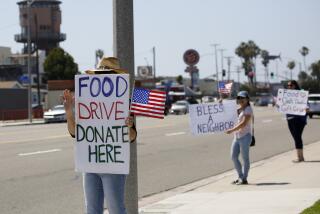Letters: Being wealthy isn’t a sin, but ...
- Share via
Re “It’s no sin to be rich,” Opinion, Dec. 27
Richard Riordan and Eli Broad are notable for their business acumen and philanthropic efforts, but their idea that we should rely on philanthropy to fulfill many societal needs is problematic.
They decry “onerous” taxes. Onerous? We are taxed at historically low federal rates, and income inequality continues to widen. When an extraordinarily wealthy candidate for president pays an effective federal income tax rate of about 14%, would a few-percentage-point increase stop him from amassing more wealth?
Broad and Riordan correctly note that the key to success in a global economy is education. At the same time, they posit that we should rely on the goodwill of the wealthy to subsidize schools and training. Nonsense.
Supreme Court Justice Oliver Wendell Holmes once sagely declared that “taxes are what we pay for a civilized society.”
Being rich is not a sin, but failing to support public programs through taxes that benefit all of society is.
Barbara H. Bergen
Los Angeles
Americans without college degrees are more likely to be unemployed not because they lack education but because the economy does not include jobs for them.
At a time when even college graduates are struggling to find well-paying jobs, the solution to the growing wealth gap is not simply to educate everyone more but rather to provide living-wage jobs for all. Raising the minimum wage would help, allowing the low-skilled service jobs that are an increasing portion of the job market to become middle-class jobs that people could live on.
It is not a sin to be wealthy, but it is a bad idea to attribute the rising wealth gap in the U.S. to poor education. This wealth gap is a symptom of a globalized economy that outsources and eliminates middle-class jobs.
Until Americans are willing to rethink this economy, this problem will not go away.
Marjorie Hunt
Sierra Madre
True, to be rich is not a sin. In fact, wealth is good, which is why everybody wants a piece of it. I applaud wealthy philanthropists like Riordan and Broad who use their riches smartly.
Don’t they think, though, that in the U.S., any adult working full time deserves a decent living wage?
Let’s hope many more wealthy men use their resources with the talent and creativity shown by Broad and Riordan.
Daniele Desieux
West Hollywood
The “sin” is the huge wage difference between a CEO and a company’s average worker.
The “sin” is running a company for short-term gains to the detriment of its long-term stability, so that the stock price and the huge salaries for those at the top are pumped up.
The “sin” is being able to buy votes in Congress.
The “sin” is the secretary paying a higher effective tax rate than the CEO.
The “sin” is thinking that only donors enable charities to do their work, when in fact a very large portion of their funds comes in the form of tax breaks that are covered by you and me.
The “sin” is an economic system that favors the wealthy over the poor and everyone in between.
Bill Dietsch
Santa Barbara
Riordan’s and Broad’s piece reminds me of something my grandfather once told me. In response to claims that attaining great wealth changes people, making them greedy and insensitive, he explained that having lots of money simply makes people more of what they are:
“If you are generous, having lots of money allows you to be more generous; if you are a jerk, lots of money makes you a bigger jerk.”
Ken Morrison
Tustin
ALSO:
Letters: What real humility looks like
Letters: A race to the bottom on taxes
Letters: African problems are world problems
More to Read
A cure for the common opinion
Get thought-provoking perspectives with our weekly newsletter.
You may occasionally receive promotional content from the Los Angeles Times.






